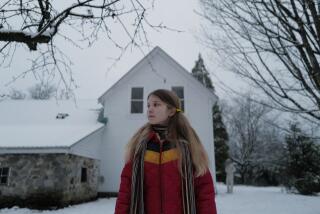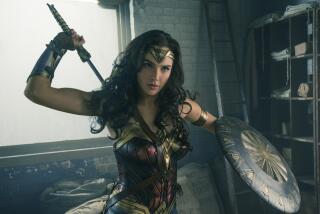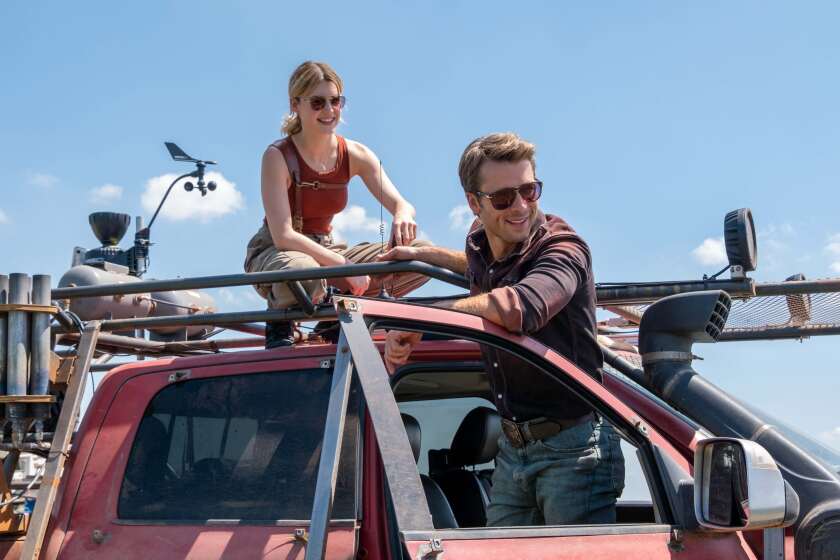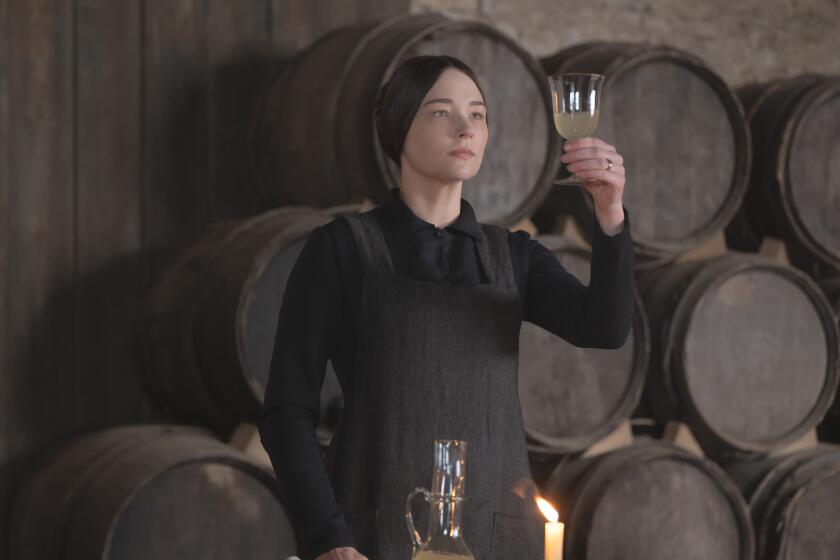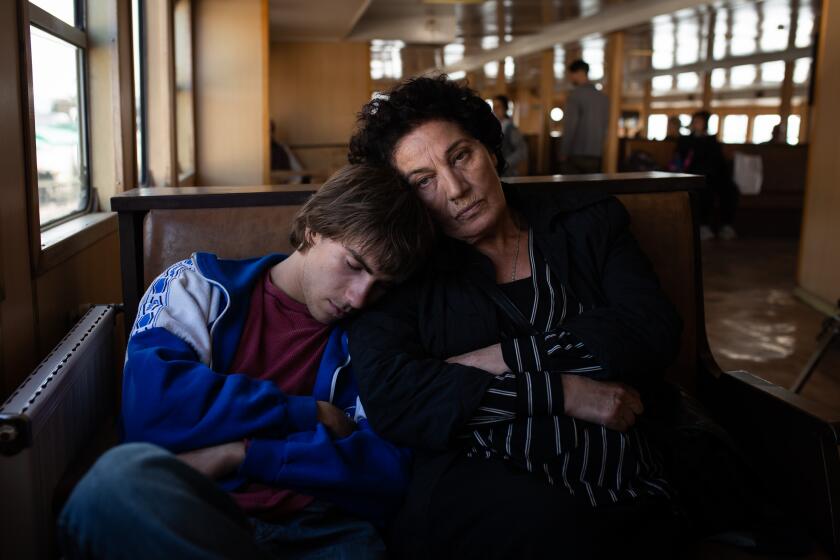‘Canyon’: Trying to Bridge Life’s Chasms
When God wants to punish us, or so the saying goes, he gives us what we want. And for all those who’ve mumbled and grumbled about the lack of serious adult motion pictures, God and his designated director, Lawrence Kasdan, have given us “Grand Canyon.”
On the surface, “Grand Canyon” is everything we’ve been missing from the major studios. Set in today’s Los Angeles, it deals not with mobsters or murderous social misfits but instead concentrates on the small pleasures and terrors of everyday life. Its half-dozen intertwined protagonists, all played by fine, serious actors, are sensitive, right-thinking human beings who worry about the world and their place in it. With all this tidily in place, what went wrong?
The problem is that “Grand Canyon” really believes it is God’s gift to the moviegoing public. As sanctimonious as it is sincere, this is a well-meaning picture that is seriously stuck on itself, that can’t hide its air of self-satisfaction. A study in midlife crisis on the order of “Why Do Bad Things Happen to Good People?,” it makes the unfortunate error of thinking it is wiser than it really is.
Director Kasdan (who also co-wrote the script with his wife, Meg Kasdan), is best-known for “The Big Chill,” an ensemble look at the ‘60s generation set a few years after college. “Grand Canyon” deals, though not exclusively, with the same kind of upwardly mobile types a decade later, well-off citizens who seem to have everything but are burdened with a sense that the world is not working right. And, as the film unfolds, one can’t help thinking, however involuntarily, about the Martin Mull middle-class blues lyric that goes, “I felt so low down deep inside, I threw my drink across the lawn.”
“Grand Canyon” (at the Odeon Cinema Westwood, rated R for language) opens with two best friends sharing seats at a Lakers’ game. Mack (Kevin Kline) turns out to be a successful immigration lawyer with a wife (Mary McDonnell) and teen-age son in Brentwood and a fetching secretary named Dee (Mary-Louise Parker) down at the office. Davis (Steve Martin) is a highly successful film producer whose license plate reads “GRSS PNTS” and who feels, not without reason, that Western Civilization is doing just fine.
Mack, hobbled by terminal ennui, is not so sure, and after the game his vague malaise turns concrete as his car breaks down deep in Inglewood and a group of local desperadoes threaten to take his vehicle and quite possibly his life. Both are saved by the timely intervention of Simon (Danny Glover), a black tow-truck operator who calmly takes charge of the situation. Mack is properly grateful, and before you can say “yuppie Angst “ Simon has sat Mack down and begun one of his trademark discussions about the way the world is going to hell in a hand basket.
“Grand Canyon” cuts back and forth between the oddly intertwined lives of all these people, as well as Jane (Alfre Woodard), Dee’s best friend, plus Simon’s sister, who lives in a gang-infested neighborhood and fears for her son’s future. And it is not all talk either, because the Kasdans have, if anything, overstuffed their script with everything from drive-by shootings and abandoned babies to earthquakes and heart attacks.
Yet, as much as “Grand Canyon” seems to have its heart in the right place, it can’t shake an air of glibness, of contrivance, of being a tourist’s view of serious problems. This is especially true in the sections dealing with Simon’s relations in South Central L.A., which wants to make us feel as moved about the problem of gangs as “Boyz N the Hood” did but is unable to muster the necessary grit to do so.
Though Steve Martin is appropriately droll as the producer who rains misery on his unhappy director (a cameo by Kasdan himself) and Mary McDonnell, fresh from “Dances With Wolves,” has her moments of strong emotion as Mack’s wife Claire, “Grand Canyon’s” air of enervation has taken a heavy toll on Mack himself. Though the man’s concerns about the state of the world are surely valid, Kline plays so much of the film in a kind of hazy daze that our sympathy for Mack quickly evaporates. And Glover, lacking the kind of richly drawn character he had to work with in “To Sleep With Anger,” is reduced to playing Simon like a poor but honest worker-philosopher, a grease-stained fount of sage folk wisdom.
If “Grand Canyon” suffers most from anything, it is from an excess of this kind of Hollywood wisdom, of homilies and sayings and platitudes. Not only are almost all the adults so afflicted, but Mack and Claire’s teen-age son need only get a job as a camp counselor before he, too, starts spouting bromides to his little charges. Must be something in the genes.
Though his film does at times come off sounding like Dr. Joyce Brothers made it, Kasdan must be given credit for wanting to do something serious and for deciding to deal with adult issues and themes. He knows exactly how he wants an audience to feel, but making a film that will create those feelings turns out to be not so easy a task.
‘Grand Canyon’ Kevin Kline: Mack Mary McDonnell: Claire Danny Glover: Simon Steve Martin: Davis Mary-Louise Parker: Dee Alfre Woodard: Jane
Released by Twentieth Century Fox. Director Lawrence Kasdan. Producers Lawrence Kasdan, Charles Okun, Michael Grillo. Associate Producer Meg Kasdan. Screenplay Lawrence Kasdan & Meg Kasdan. Cinematographer Owen Roizman. Editor Carol Littleton. Costumes Aggie Guerard Rodgers. Music James Newton Howard. Production design Bo Welch. Running time: 2 hours, 14 minutes.
MPAA-rated R (language).
More to Read
Only good movies
Get the Indie Focus newsletter, Mark Olsen's weekly guide to the world of cinema.
You may occasionally receive promotional content from the Los Angeles Times.

